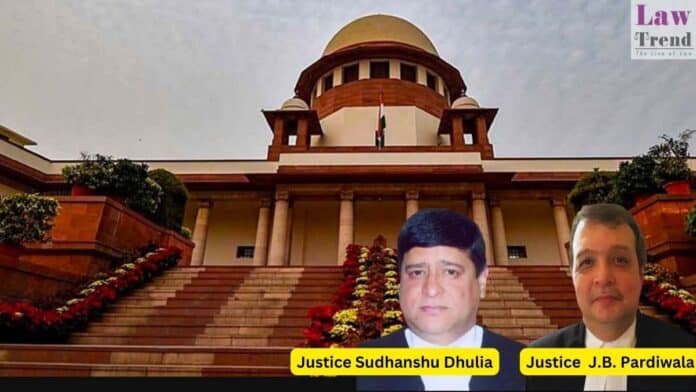Keeping the facade of a broken marriage alive when a marital relationship has grown bitter with time inflicts cruelty on both the husband and wife, the Supreme Court has said while accepting the man’s allegation of cruelty against his wife and allowing his appeal challenging a high court order.
The court took note of the couple having not cohabited in the last 25 years during which the wife lodged multiple criminal complaints against him.
It said matrimonial cases before the courts pose a different challenge, unlike any other, as they involve human relationships with their bundle of emotions, faults and frailties.
The top court said it is not possible in every case to pinpoint an act of “cruelty” or blameworthy conduct of the spouse, and the nature of relationship, the general behaviour of the parties towards each other, or long separation between the two are relevant factors which a court must take into consideration.
A bench of Justice Sudhanshu Dhulia and JB Pardiwala said, “A marriage which has broken down irretrievably, in our opinion spells cruelty to both the parties, as in such a relationship each party is treating the other with cruelty. It is therefore a ground for dissolution of marriage under Section 13 (1) (ia) of the Act (Hindu Marriage Act)”.
“In our considered opinion, a marital relationship which has only become more bitter and acrimonious over the years does nothing but inflicts cruelty on both the sides. To keep the fa ade of this broken marriage alive would be doing injustice to both the parties,” the bench said.
The top court passed the verdict on an appeal by the husband against an order of the Delhi High Court which had ruled that mere filing of criminal cases against him by his wife does not constitute cruelty.
The bench noted the couple was living separately for the last 25 years and was childless.
“There are bitter allegations of cruelty and desertion from both the sides and multiple litigations between the two in the last more than 25 years. This embittered relationship between the appellant and the respondent which has not witnessed any moment of peace for the last 25 years is a marital relationship only on paper. The fact is that this relationship has broken down irretrievably long back,” it said.
While noting that the high court has taken a view that mere filing of criminal cases against the husband does not constitute cruelty, the apex court said the number of criminal cases lodged by the wife against her husband is far too many.
“All these cases have either resulted in discharge or acquittal of the appellant husband, if not before the pronouncement of the Judgment of the Delhi High Court but definitely after the pronouncement of the Judgment of the Delhi High Court,” it noted.
“The multiple Court battles between them and the repeated failures in mediation and conciliation is at least testimony of this fact that no bond now survive between the couple, it is indeed a marriage which has broken down irretrievably,” it said.
Referring to a 2006 three-judge verdict of the top court, the bench said it held that repeated filing of criminal cases by one party against the other in a matrimonial matter would amount to “cruelty”.
It said another aspect the court must consider is that for the last 25 years the husband and wife have not cohabited.
“There is absolutely no scope of reconciliation between the parties. There is in fact no bond between the two and as the Law Commission in its 71st report said about such a marriage, which is a marriage which has de facto broken down, and only needs a de jure recognition by the law. The same was reiterated by the Law Commission in its 217th report,” it said.
The court referred to similar judgements delivered in the past.
“In all the above cited cases, this Court in exercise of its power under Article 142 of the Constitution of India has dissolved the marriage on the ground of irretrievable breakdown, a ground which otherwise does not exist under the Hindu Marriage Act,” it said.
The bench said in its 2006 verdict the apex court had made a strong recommendation to the Union of India to consider adding irretrievable breakdown of marriage as a ground for divorce under the Hindu Marriage Act.
The bench said what has to be examined is the entire matrimonial relationship, as cruelty may not be in a violent act but from injurious reproaches, complaints, accusations, taunts, etc.
“When we take into consideration the facts as they exist today, we are convinced that continuation of this marriage would mean continuation of cruelty, which each now inflicts on the other. Irretrievable breakdown of a marriage may not be a ground for dissolution of marriage under the Hindu Marriage Act, but cruelty is,” it said.
The top court upheld the order of the trial court granting the husband the decree of divorce and set aside the order of the high court, saying “Their marriage shall stand dissolved”.
It directed the husband to pay Rs 30 lakh to his wife as permanent alimony in four weeks.




